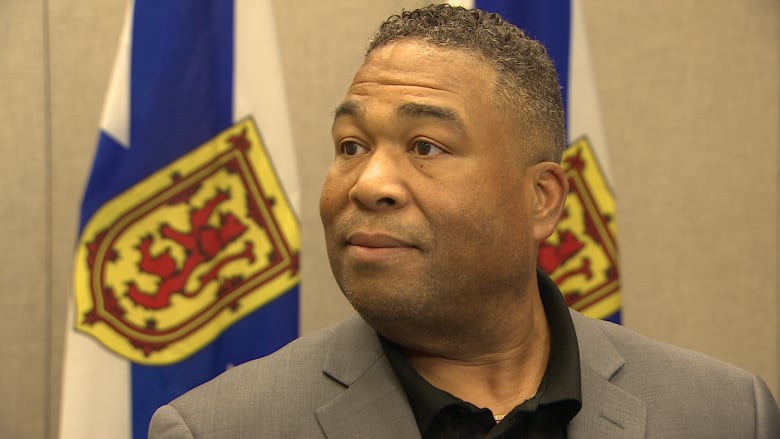'Loaded language' and 'theatrics' get in way of helping marginalized communities: Tony Ince
'I'm not going to leave my community behind,' says African Nova Scotian Affairs minister

As Tony Ince listened to opposition MLAs on Thursday repeatedly speak out against the Liberal government's Education Reform Act, his frustration grew.
MLA after MLA spoke about why they believed the act removed voices and representation of minority groups from the education system.
Visibly bothered at times, eventually Ince started writing at his desk.
When opposition members were finished, and before Education Minister Zach Churchill spoke to close the debate, Ince stood, notes spread out in front of him. It's rare for government members other than a bill's sponsoring minister to speak about controversial legislation, but Ince, the lone African Nova Scotian in the House, felt compelled.
For 17 minutes he talked about — among other things — being troubled by what to him, at times, felt like the "theatrics" and "loaded language" people used to question the effect the government's bill would have on the voices of African Nova Scotians and other historically marginalized groups. People were presenting themselves as "protectors," said Ince.
"I've taken this role — and many people in the community know that I've taken this role — to advocate on their behalf," the African Nova Scotian Affairs minister told the legislature.
He talked about the challenge of his intentions being questioned by members of his community and people within government.
'All of us have a part to play in this play'
Ince talked about the repeated frustrations through the years of getting voice and attention for issues that mattered to his community, such as the Home for Colored Children, which his government addressed when it came to power.
"That issue sat around for years. Where was the advocacy then? I can point to many other issues," said Ince.
Government hasn't listened for years, and that applies to all three parties, he said, mentioning the challenges he experienced trying to get government to listen during his time with the Black Educators Association. If things are to improve for all communities, he said, people must find a better way of working together.
"All of us have a part to play in this play. Mr. Speaker, I got involved in this because of some of the antics that I've seen in this House for years," said Ince.
"I vowed, and I will keep that vow, that I would not do this and become involved in this without sitting down and really consciously thinking about some of the decisions that I make."
'I'm not going to leave my community behind'
During an interview Friday, Ince said it was difficult to speak, but it was also important for him to do so, at least partly to confront the suggestion the government isn't considering all voices.
"I am an individual who is from the community. I've reminded my colleagues when we're around the table, when we're sitting down discussing these issues, that there is a key component and that the African Nova Scotian and the Mi'kmaq and the Acadian community have been left out, or left on the sidelines for a long period of time," he said.
"I'm not going to leave my community behind. I've said to people I'd be ready to lose my job, but I will make sure that our voices are heard at the table and that we are included in that conversation — not just in one section. It's a systemic issue."
'True history' must be taught
It's for that reason Ince wants to see better collaboration by the Education Department with the Health, Community Services and Justice departments. Students today can face a variety issues that can challenge their education, such as poverty and problems at home. Ince believes things are moving toward that collaborative approach, but said it's vital to help better serve students and communities who are most often at a disadvantage
"All of those things are linked through education," said Ince.
Ince also talked about the importance of doing a better job teaching the "true history" of groups whose stories and culture have been excluded or only sparingly taught. Reports in the last week of racist activity in several Nova Scotia schools point to how much work there still is to do, he said.
"We might be in a different position and state right now in a society … if that true history — all of it — was told. There might be different awareness of how we treat each other."
Thursday was by far the most vocal and forceful Ince has been in the House since his first election back in 2013. It runs against his nature to some degree, he said, but something was stirred in him this week, and he doesn't plan to turn back now.

